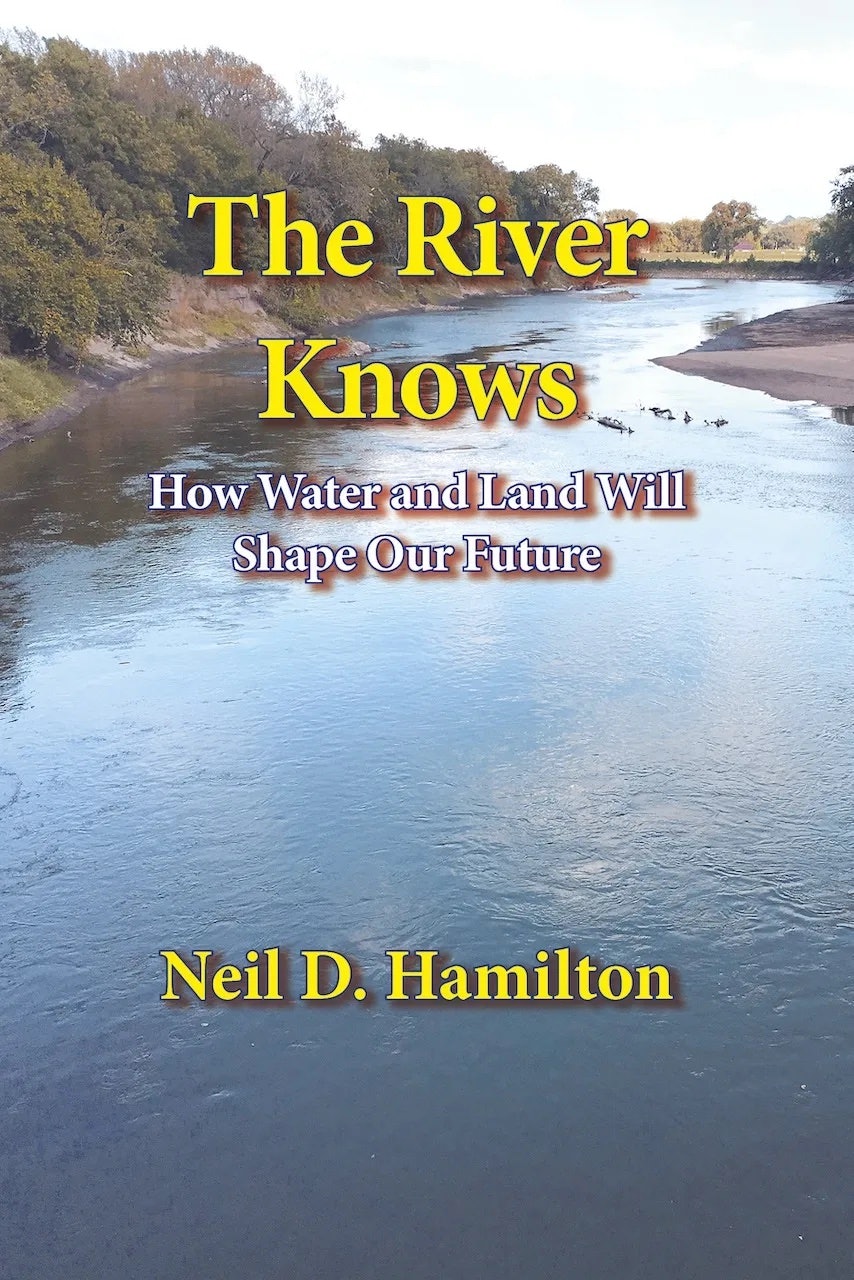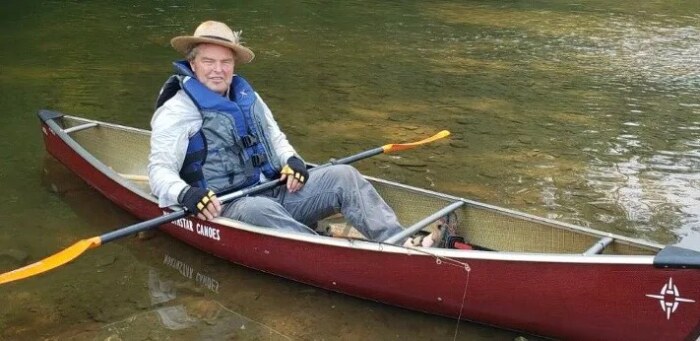This book review first appeared on Larry Stone‘s free email newsletter, Listening to the Land.
Retired Drake University Law Professor Neil Hamilton wants Iowans to take a long, hard look at what we’ve done, and what we’re doing to our state.
“ . . . . something has changed in Iowa and not for the better,” laments Iowa native Neil Hamilton, who grew up on an Adams County farm and spent his career at Drake University as a law professor focused on food and agriculture.
Hamilton analyzes those changes in The River Knows: How Water Will Shape Our Future, a sequel to his 2022 book, The Land Remains. In both books, Hamilton lays the blame for the damaging changes squarely at the feet of industrial agriculture. The politics and policies of agribusiness have transformed Iowa, he said.

In making the case, Hamilton is assisted by narrative from “The River,” who has endured countless “injuries and insults” while trying to remain “hopeful and resilient.” The River urges the reader to “get out on the river” to consider its role in providing “natural beauty, a place to rest, a home for nature” and more.
But Hamilton, whom The River dubs “The Professor,” doesn’t pull punches when describing many Iowans’ lack of respect for our land and water. “If the discussion offends you,” Hamilton says, “the offense may be well intended.”
For example:
“The long history of the Iowa Farm Bureau’s efforts to deny, deflect, delay and even deceive the public concerning agriculture’s impact on the environment has had great success,” Hamilton asserts. The farm group, which Hamilton describes as “an appendage to a powerful financial insurance company,” has opposed almost all environmental regulations.
He points to the farm organization’s contentions that farmers voluntarily use practices that protect soil and water, while data actually show that our rivers and streams continue to be impaired.
Who’s to blame? Big Ag defenders say we must produce all we can to “feed and fuel the world.” But Hamilton doesn’t accept that excuse.
“We are happy to say it is just the ‘system’ that is the problem, not the actions of the individuals,” Hamilton writes. “The reality is we privilege the right of any farmer or landowner to farm their land however they choose, over any idea of responsibility to the public.”
Hamilton said the industrialization of agriculture, with a focus on all-out production, has forced farmers into a system of dependence on outside inputs from big business. Thus, USDA farm programs and subsidies to farmers end up funneling money back to the international agribusinesses “who stand on the shoulders (and necks) of America’s farm families.”
Public relations campaigns by agricultural groups may revere those farmers with almost religious fervor, Hamilton said. “(I)t is a message of Agri-Nationalism that basically says farmers are always right, regulations are always bad, and the public must support agriculture at all costs.”
Even farmers themselves may be reluctant to criticize the unsustainable operations or activities of their neighbors, Hamilton notes. “It is just as hard in farm country to admit some farm practice is bad as it is to admit you are an atheist or agnostic.”
Much of Hamilton’s “intended offense” is directed at Republicans—but he does not spare the Democrats, whom he said should have been developing new leaders to follow former Senator Tom Harkin and former Governor Tom Vilsack. And the Biden administration’s climate initiatives, lacking the necessary agricultural regulations or funding, “may largely be another exercise in self-delusion.”
Inaccurate public perceptions—“opinions Iowans have convinced ourselves of that may not be true”—compound the lack of understanding of the problem, Hamilton declares.
Examples:
“Ethanol is a green fuel.” But not if growing the corn to produce it pollutes the water, erodes the soil, uses fossil fuels, and converts marginal land to crops.
“Soil erosion is not a major concern for Iowa.” Topsoil does not renew itself at the rate of 5 tons per acre per year, despite that common mantra.
“The land can absorb and handle the amounts of manure applied.” Animal waste often washes off the land or leaches into tile lines.
“Farmers do not use any more fertilizer or nitrogen than is necessary.” Many farmers consider nitrogen an insurance policy, so apply more than agronomists recommend.
The River questions whether state officials value or know about clean water, as demonstrated by the defunding of the IOWATER program that once provided training for people to monitor local water quality. “I guess the theory was why do we want people looking when we know what they will find is bad news,” The River observes cynically. “They might start asking questions.”
On a positive note, The River suggests an option to conservatives who may oppose regulations requiring conservation measures. Why not give landlords tax credits if their farm lease requires the tenant or operator to plant cover crops?
In his hope that nature might help heal the divide between political opposition to land protection and the public’s desire for more recreational areas, trails, and open spaces, Hamilton longs for “Ding Darling Republicans, the outdoors people and nature lovers.” He has planned a two-day Iowa Nature Summit on November 16 and 17 to bring together organizations, individuals, educators, students, government agencies, adults and youths to “set a plan for the future, a plan underpinned by concrete commitments of action . . .”
Yes, many in the industrial agriculture community will take offense at Hamilton’s writing. But perhaps they’ll be more open to suggestions from The River:
“First, Iowa needs clearer thinking,” rather than the “domination” mindset of our relationship with the lands and waters.
“Second, Iowa needs more imagination and bigger ideas” to break out of the “century long infatuation” with growing corn and soybeans.
“. . .you could weave a whole new set of nature-based economic activities into your rural agricultural structure, if you had the vision,” The River counsels.
Also, “you need to quit fooling yourself with false claims of progress and consider the realities of what is happening to the land and water.”
Sage advice from The River tempers Hamilton’s sharp, yet insightful critiques of how badly we’re treating our rivers (and our land.) The River Knows . . . that Iowans need to collaborate and cooperate to restore the water quality our grandchildren’s future depends on.
The River Knows was released on July 23 and is available for $24.95 through Ice Cube Press.
Larry Stone explored Iowa for 40 years, both as an outdoor writer/photographer for the Des Moines Register and as a freelance nature writer and photographer. He has written five books, and his work has appeared in several conservation magazines. He is a member of the Clayton County Conservation Board. He and his wife, Margaret Stone, manage woodlands and prairies on their farm along the Turkey River near Elkader.
Top photo of Neil Hamilton was taken by Joe McGovern and is published with permission.


1 Comment
As someone who has followed Iowa Farm Bureau impacts on Iowa policies for several decades...
…I can testify that the IFB-criticizing quotes from Neil Hamilton are richly deserved. It is gratifying to read them. Most spot-on criticisms of the IFB happen only in private conversations.
I could tell stories about industrial ag, but a far more interesting voice is that of Illinois farmer John Phipps, per below. His essay is several years old, but very relevant. WOTUS is Waters of the United States.
“The longer I watch the WOTUS hysteria roll on, the more convinced I am that farmers want nothing less than blanket immunity from pollution that occurs from their actions. In addition, we adamantly refuse to take any responsibility for anthropogenic climate change or even acknowledge that there are inherent production risks that should be coped with individually like other businesses do – insisting on heavily subsidized crop insurance and other economic guarantees we despise in other industries. We have become a fact-resistant echo-chamber that inhibits new ideas and supports an incredibly boring one-sided discussion of our future.
Our new motto as an industry: Nothing Is Our Fault.”
In case anyone is interested, here’s the rest.
http://johnwphipps.blogspot.com/2016/01/accountable-ag.html
PrairieFan Mon 24 Jul 3:46 PM